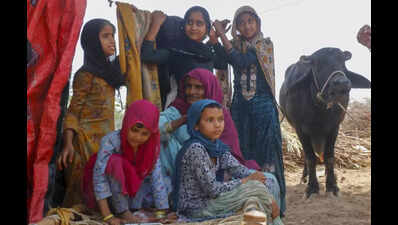Gurgaon: From walking kilometres every day to reach school, facing harassment along the way, to seeing few peers complete their studies, the road to education for several Nuh girls is not just long but also filled with several doubts. "What use will education be of?" For many, this question becomes the final straw before they exit classrooms to enter lives of domestic chores and agricultural labour. "I never saw any of my friends going to school," says 10-year-old Lakhima, who dropped out after just two years.
"Those who did, left early. Most of them are now helping at home. Even if I go, what's the use?" In villages around the government-run all-girls school in Nagina, stories like Lakhima's are common.

The school serves students from 12 surrounding villages, but without transport, the daily commute becomes a test of safety and stamina. Muskan, another girl who once walked the 8-kilometre stretch to school, recalls why she stopped. "Men on bikes used to follow and tease us," she says.
"When I told my family, they told me to stop going. They said girls like me are meant for household work, not studies." She is eager to return but the commute stops her.
Ruksar, a Class 8 student from a govt school in Nagina, feels this might be her final year. "The distance, the broken roads, the heat—it's just too much," she says. "If we had a bus, I would have never thought of leaving.
" According to official data, only 12,981 students were enrolled in Class 12 last year in Nuh—just 9% of class 5 strength. In 2022, the administration launched free pick-up and drop services for schoolgirls across 45 routes in five blocks. Kusum Malik, district coordinator for the Nipun Bharat Mission, said, "That initiative worked.
Dropout numbers fell. Teachers and principals are still trying their best to bring the girls back." These buses do not ply in several Nuh villages including Nagina.
Deputy commissioner Vishram Meena said education remains a top priority. "We're working towards a zero-dropout district. Officers are conducting regular inspections, and we've introduced the ‘Champion Parent Award' to encourage families.
" According to the 2011 census, the female literacy rate in Nuh stood at a mere 37.6%. The overall literacy rate in district was 56.
1%, with a male literacy rate of 73%. Additionally, Nuh's education system is severely understaffed. The district has 504 primary, 256 middle, 7 high, and 141 senior secondary schools, along with five Kasturba Gandhi Balika Vidyalayas, five Aarohi Model Schools, and eight Sanskriti Model Schools.
Four of the five blocks currently lack block education officers. All five block resource coordinator posts and all eight elementary education officer posts are vacant. Three out of five deputy district education officer (DEO) positions are also unfilled, with Faridabad's DEO holding additional charge of Nuh.
Only one-third of the 5,828 sanctioned primary teacher posts are filled, leaving 3,898 vacancies..















